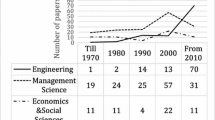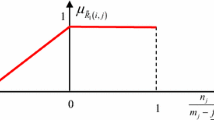Abstract
Goal programming provides the decision maker (DM) with one decision vector, but does not help the DM learn his preferences, since it does not explore the nondominated set. Proponents of goal programming claim that the DM has a multiattribute utility function which is assumed to be separable, additive and stable over decision iterations. These are extremely restrictive assumptions. In addition, the way the priority weights drive a linear equation system is very hard to characterize.
This paper initiates discussion of naive weights. Naive weights are obtained when the DM associates the highest weights with the most important goals. The unsatisfactory nature of this weighting procedure is demonstrated by evaluating eigenvalues of criterion matrices. The paper concludes with pessimistic remarks about the applicability of goal programming. Instead, multiobjective linear programming is suggested.
Access this chapter
Tax calculation will be finalised at checkout
Purchases are for personal use only
Preview
Unable to display preview. Download preview PDF.
Similar content being viewed by others
References
Charnes, A.; Cooper, W. E. Management Models and Industrial Applications of Linear Programming. John Wiley & Sons, New York, 1961.
Debreu, G. Theory of Value, An Axiomatic Analysis of Economic Equilibrium. Cowles Foundation Monograph, Yale University Press, 1959.
Evans, J. P.; Steuer, R. E. “A Revised Simplex Method for Linear Multiple Objective Programs,” Math. Programming, 5 (1973), 54–72.
Farquhar, Peter H. “A Survey of Multiattribute Utility Theory and Applications,” Management Sci., 1977.
Harrald, et al. “The Use of Goal Programming in Evaluating Managerial Standards for a Marine Environmental Protection Program,” Working paper, U. S. Coast Guard Headquarters, 1975.
Hoffman, Thomas R. “Design and Computational Experience with an Interactive Goal Programming Code,” Working paper #29, School of Business Administration, University of Minnesota, November 1975.
Ignizio, James B. Goal Programming and Extensions. D. C. Heath and Co., Lexington, MA., 1976.
Ijiri, Yuji Management Goals and Accounting for Control. North-Holland Publishing Co., Amsterdam; Rand McNally and Co., Chicago, 1965.
Keeney, Ralph L; Raiffa, Howard Decisions with Multiple Objectives: Preferences and Value Tradeoffs. John Wiley & Sons, New York, 1976.
Lee, Sang M. Goal Programming for Decision Analysis. Auerbach Publishers, Philadelphia, 1972.
Miller, George A. “The Magical Number Seven, Plus or Minus Two: Some Limits on Our Capacity for Processing Information,” Psychological Rev., March 1956, 81–97.
Morse, J. N. “Human Choice Theory: Implications for Multicriteria Optimization,” Working paper, Dept. of Business Administration, University of Delaware, June 1977.
Morse, J. N. “Prioritization and Pruning in Multicriteria Programming Problems,” Unpublished Ph.D. dissertation, University of Massachusetts, 1978 (expected).
Scheerer, Martin “Problem-Solving,” Sci. Amer., April 1963, 2–9.
Shepard, Roger N. “On Subjectively Optimum Decisions Among Multi-attribute Alternatives,” in M. W. Shelly and G. L. Bryan, eds., Human Judgment and Optimality, John Wiley & Sons, New York, 1964.
Simmonard, Michel Linear Programming. Prentice-Hall, Englewood Cliffs, N. J., 1966.
Steuer, Ralph “Linear Multiple Objective Programming: Theory and Computational Experience,” Unpublished Ph.D. dissertation, University of North Carolina, 1973.
Tatsuoka, Maurice Multivariate Analysis. John Wiley & Sons, New York, 1971.
Troutman, C. Michael; Shanteau, James “Do Consumers Evaluate Products by Adding or Averaging Attribute Information?” J. of Consumer Research, 3 (September 1976), 101–106.
Tversky, Amos “Choice by Elimination,” J. of Math. Psychology, 9 (1972), 341–367. (a)
Tversky, Amos “Elimination by Aspects: A Theory of Choice,” Psychological Rev., 79 (July 1972), 281–299. (b)
Yu, P. L.; Zeleny, Milan “The Set of All Nondominated Solutions in Linear Cases and a Multicriteria Simplex Method,” J. of Math. Anal. Appl., 49 (February 1975), 430–468.
Zeleny, Milan Linear Multiobjective Programming. Lecture Notes in Economics and Mathematical Systems, No. 95, Springer-Verlag, New York, 1974.
Author information
Authors and Affiliations
Editor information
Editors and Affiliations
Rights and permissions
Copyright information
© 1978 Springer-Verlag Berlin Heidelberg
About this paper
Cite this paper
Morse, J.N. (1978). A Theory of Naive Weights. In: Zionts, S. (eds) Multiple Criteria Problem Solving. Lecture Notes in Economics and Mathematical Systems, vol 155. Springer, Berlin, Heidelberg. https://doi.org/10.1007/978-3-642-46368-6_19
Download citation
DOI: https://doi.org/10.1007/978-3-642-46368-6_19
Publisher Name: Springer, Berlin, Heidelberg
Print ISBN: 978-3-540-08661-1
Online ISBN: 978-3-642-46368-6
eBook Packages: Springer Book Archive




